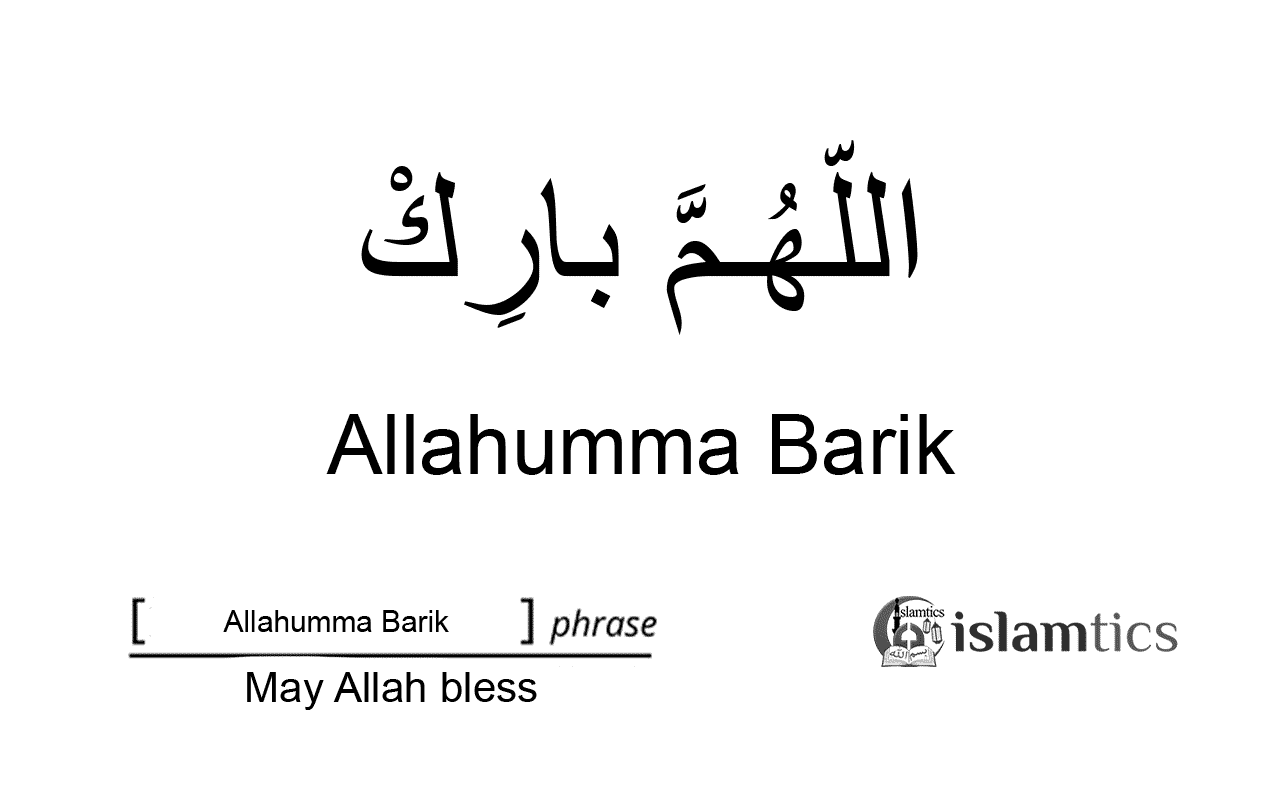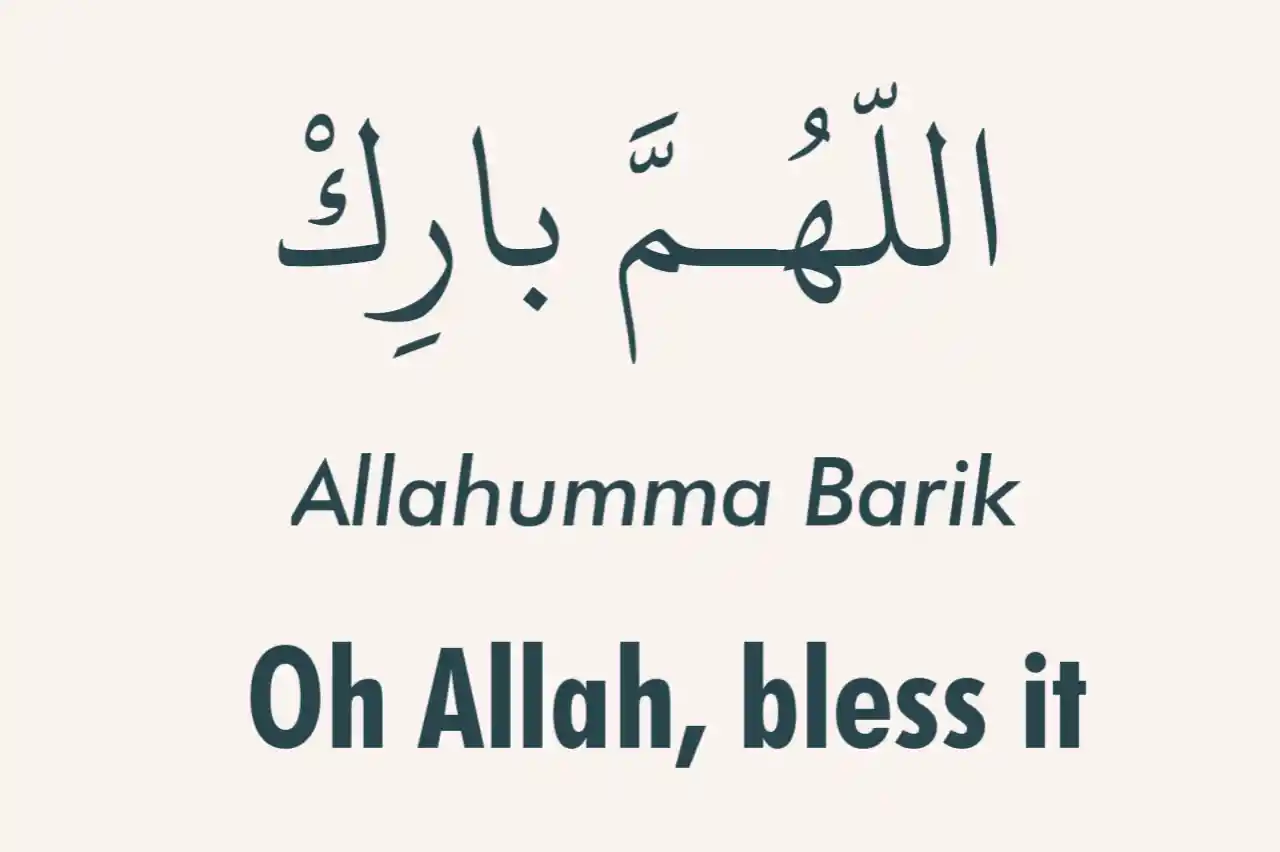Unlock The Power Of "Allahuma Barik": A Journey Through Faith, Blessings, And Gratitude
Have you ever wondered about the profound meaning behind the phrase "Allahuma Barik"? Well, let me tell you, this isn't just some random prayer—it's a powerful invocation that holds deep spiritual significance for millions around the globe. In this article, we're diving headfirst into everything you need to know about this beautiful phrase, its origins, and how it can transform your life. So buckle up, because we're about to embark on an epic journey of faith, blessings, and gratitude!
This isn't just another article filled with fluff. We're going to break down what "Allahuma Barik" really means, explore its historical roots, and uncover why it's so important in Islamic tradition. Whether you're already familiar with it or hearing it for the first time, there's something here for everyone. Think of this as your ultimate guide to understanding and embracing this powerful supplication.
Before we dive deeper, let's set the stage. This phrase isn't just a collection of words; it's a heartfelt plea to God, asking for blessings, abundance, and continuous gratitude. It's about recognizing the blessings in your life and asking for even more. Ready to learn more? Let's get started!
- Allume Mon Feu Your Ultimate Guide To Igniting Passion And Connection
- Airbrush 5 En 1 Avis The Ultimate Review Thatll Have You Hitting The Buy Button
What Does "Allahuma Barik" Really Mean?
Alright, let's get straight to the point. The phrase "Allahuma Barik" translates roughly to "O Allah, bless" or "O Allah, grant abundance." But it's so much more than just those words. This phrase is a powerful tool for invoking blessings and expressing gratitude. It's like a direct line to the Divine, where you're asking for blessings in all aspects of life.
When you say "Allahuma Barik," you're not just asking for material blessings. You're asking for spiritual growth, inner peace, and a deeper connection with the Creator. It's a reminder that everything we have comes from Allah, and that we should always be thankful for His generosity.
Breaking Down the Words
Let's take a closer look at the individual words:
- Nude Tiktok Unpacking The Trend Controversy And What It Really Means
- Homemade Nuggets The Ultimate Guide To Making Crispy Nuggets At Home
- Allahuma: This is a direct call to Allah, similar to saying "O Allah" or "Oh God." It's a way of addressing the Divine in a personal and intimate manner.
- Barik: This word means "bless" or "grant abundance." It's a request for blessings, not just in terms of wealth, but also in terms of knowledge, health, and overall well-being.
Together, these words form a powerful supplication that acknowledges the blessings we already have and asks for even more. It's a beautiful reminder that life is full of opportunities for growth and gratitude.
The Historical Roots of "Allahuma Barik"
Now, let's talk about where this phrase comes from. The use of "Allahuma Barik" dates back to the early days of Islam. It's a phrase that has been passed down through generations, used in various contexts to express gratitude and seek blessings.
In Islamic tradition, supplications like this are seen as a way to communicate directly with Allah. They're not just random prayers; they're deeply rooted in the teachings of the Prophet Muhammad (peace be upon him) and the Quran. This phrase is a testament to the enduring power of faith and the importance of gratitude in our daily lives.
How It's Used in Daily Life
So, how do people use "Allahuma Barik" in their everyday lives? Well, it's often said after meals, as a way of thanking Allah for the food and asking for more blessings in the future. It's also used during times of hardship, as a way of seeking strength and guidance from the Divine.
Think of it like this: every time you say "Allahuma Barik," you're reminding yourself of the blessings in your life and asking for even more. It's a simple yet powerful way to stay connected to your faith and maintain a sense of gratitude.
Why Is "Allahuma Barik" So Important?
Let's talk about why this phrase is such a big deal. In a world that's often focused on material wealth and instant gratification, "Allahuma Barik" serves as a reminder of what truly matters. It's about recognizing the blessings in your life and asking for more, not just for yourself, but for others as well.
This phrase is important because it fosters a sense of gratitude and humility. It reminds us that everything we have comes from Allah, and that we should always be thankful for His generosity. It's a way of staying grounded and connected to our faith, even in the midst of life's challenges.
The Role of Gratitude in Islam
Gratitude is a big deal in Islam. It's not just about saying "thank you" once in a while; it's about cultivating a mindset of gratitude that permeates every aspect of your life. When you say "Allahuma Barik," you're not just asking for blessings; you're acknowledging the blessings you already have and expressing your gratitude for them.
This mindset of gratitude is key to living a fulfilling and meaningful life. It helps you stay focused on what truly matters and keeps you from getting caught up in the materialistic trappings of modern life.
How to Incorporate "Allahuma Barik" Into Your Daily Life
So, how can you start using "Allahuma Barik" in your daily life? It's actually pretty simple. You can say it after meals, before going to bed, or anytime you feel the need to express gratitude and seek blessings. The key is to make it a regular part of your routine, so it becomes second nature.
Here are a few tips to help you get started:
- Say it after meals: This is a great way to express gratitude for the food and ask for more blessings in the future.
- Use it during prayer: Incorporate "Allahuma Barik" into your daily prayers as a way of seeking guidance and blessings.
- Practice gratitude: Make it a habit to reflect on the blessings in your life and express your gratitude regularly.
By making "Allahuma Barik" a regular part of your routine, you'll start to see the positive effects it can have on your life. It's a simple yet powerful way to stay connected to your faith and maintain a sense of gratitude.
Creating a Gratitude Journal
One of the best ways to incorporate "Allahuma Barik" into your daily life is by keeping a gratitude journal. Each day, write down a few things you're grateful for and end with the phrase "Allahuma Barik." This will help you stay focused on the blessings in your life and cultivate a mindset of gratitude.
Trust me, this little practice can make a huge difference. It's like a daily reminder of all the good things in your life and a way to ask for even more blessings. Give it a try and see how it transforms your outlook on life!
The Psychological Benefits of Gratitude
Now, let's talk about the science behind gratitude. Research has shown that practicing gratitude can have a positive impact on your mental and emotional well-being. It can reduce stress, improve sleep, and even boost your immune system.
When you say "Allahuma Barik," you're not just asking for blessings; you're also giving yourself a mental health boost. It's like hitting the reset button on your brain, helping you focus on the positive aspects of your life and let go of negativity.
Gratitude and Mental Health
Studies have shown that people who practice gratitude regularly tend to be happier and more satisfied with their lives. They experience less stress and anxiety and have a more positive outlook on life. This is because gratitude helps shift your focus from what's lacking in your life to what you already have.
So, by incorporating "Allahuma Barik" into your daily routine, you're not just strengthening your faith; you're also improving your mental and emotional well-being. It's a win-win situation!
Common Misconceptions About "Allahuma Barik"
Before we wrap things up, let's clear up a few common misconceptions about "Allahuma Barik." Some people think it's just a random prayer with no real meaning, but that couldn't be further from the truth. This phrase is deeply rooted in Islamic tradition and holds significant spiritual value.
Others might think that saying "Allahuma Barik" is enough to solve all their problems, but that's not the case. While it's a powerful tool for seeking blessings and expressing gratitude, it's not a magic solution. It requires effort, faith, and a willingness to work towards your goals.
Separating Fact from Fiction
Here are a few key points to keep in mind:
- "Allahuma Barik" is a powerful supplication, but it requires faith and effort to be truly effective.
- It's not just about asking for material blessings; it's about seeking spiritual growth and inner peace.
- Practicing gratitude regularly can have a positive impact on your mental and emotional well-being.
By understanding these facts, you can avoid common misconceptions and truly embrace the power of "Allahuma Barik."
Conclusion: Embrace the Power of Gratitude
So there you have it, folks! "Allahuma Barik" isn't just a random phrase; it's a powerful tool for seeking blessings, expressing gratitude, and cultivating a deeper connection with your faith. By incorporating it into your daily life, you can transform your outlook and improve your overall well-being.
Here's a quick recap of what we've covered:
- "Allahuma Barik" means "O Allah, bless" and is a powerful supplication for seeking blessings and expressing gratitude.
- It's deeply rooted in Islamic tradition and holds significant spiritual value.
- Practicing gratitude regularly can have a positive impact on your mental and emotional well-being.
Now, it's your turn to take action. Start incorporating "Allahuma Barik" into your daily routine and see how it transforms your life. Share this article with your friends and family, and let's spread the power of gratitude together!
Table of Contents
- What Does "Allahuma Barik" Really Mean?
- The Historical Roots of "Allahuma Barik"
- Why Is "Allahuma Barik" So Important?
- How to Incorporate "Allahuma Barik" Into Your Daily Life
- The Psychological Benefits of Gratitude
- Common Misconceptions About "Allahuma Barik"
- Creating a Gratitude Journal
- Gratitude and Mental Health
- Conclusion: Embrace the Power of Gratitude
- Separating Fact from Fiction



Detail Author:
- Name : Missouri Cole Sr.
- Username : wuckert.carole
- Email : aubree58@hotmail.com
- Birthdate : 1975-04-22
- Address : 484 Jacquelyn Locks Suite 195 East Olga, OR 69365-3567
- Phone : +1 (432) 510-5044
- Company : Barrows, Nikolaus and Kshlerin
- Job : Railroad Conductors
- Bio : Aperiam possimus at voluptatem non accusantium aut magnam ipsa. Natus modi voluptatem odit ipsum totam cupiditate illum. Et eligendi minima neque unde eveniet.
Socials
instagram:
- url : https://instagram.com/dejon_tremblay
- username : dejon_tremblay
- bio : Consequatur error non et occaecati illum consequatur sed. Assumenda nihil ducimus culpa deserunt.
- followers : 1178
- following : 2839
linkedin:
- url : https://linkedin.com/in/dejon_xx
- username : dejon_xx
- bio : Omnis vel dolorem ut maxime rerum totam id.
- followers : 1468
- following : 724
twitter:
- url : https://twitter.com/dejon_tremblay
- username : dejon_tremblay
- bio : Similique quis occaecati hic odio molestias. Est ut perspiciatis quam qui accusamus veritatis libero. A ipsa animi neque modi. Quis velit expedita nobis rerum.
- followers : 993
- following : 2907